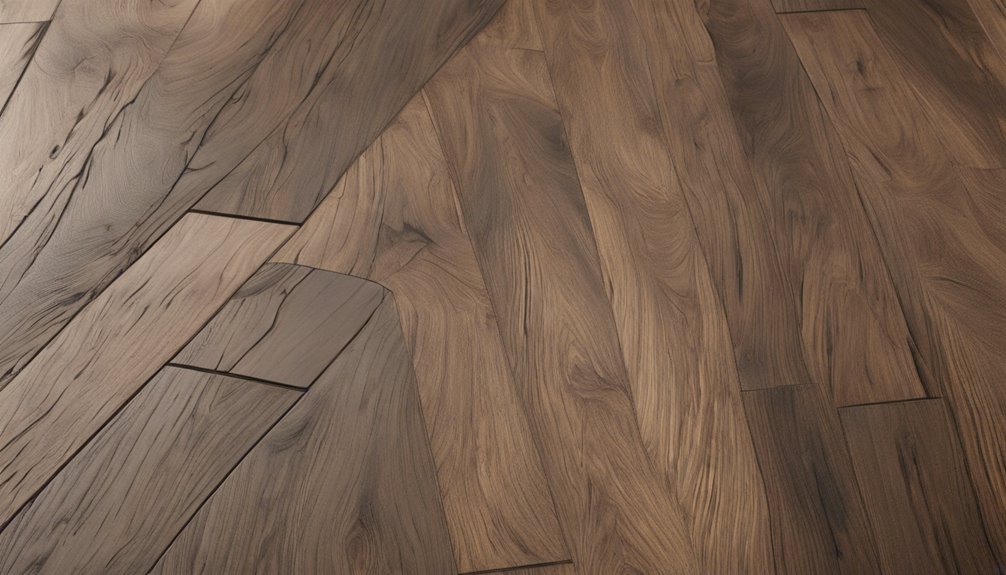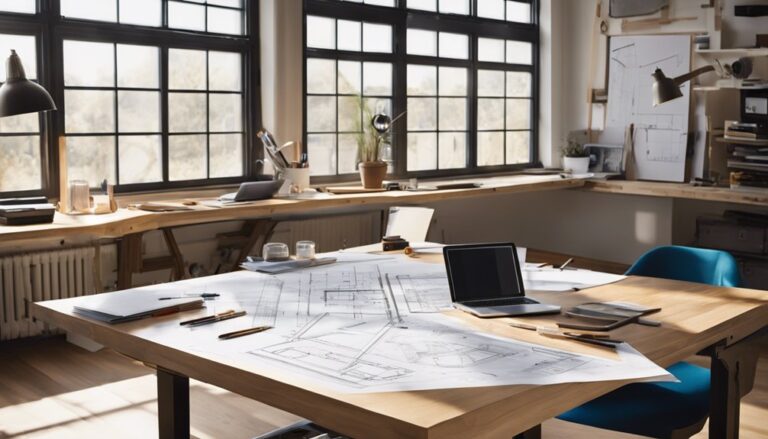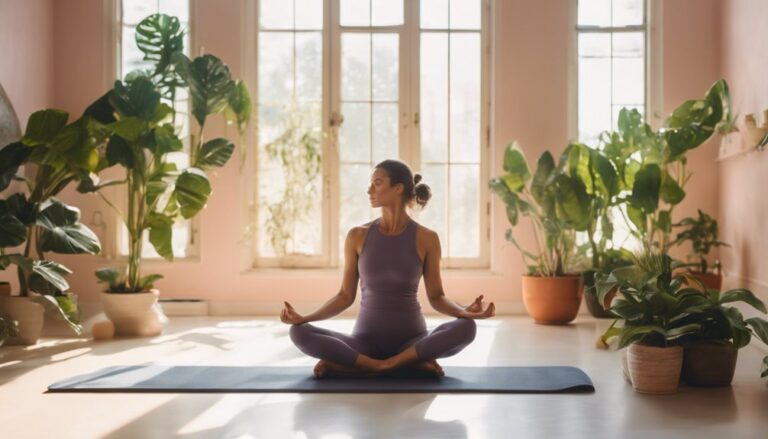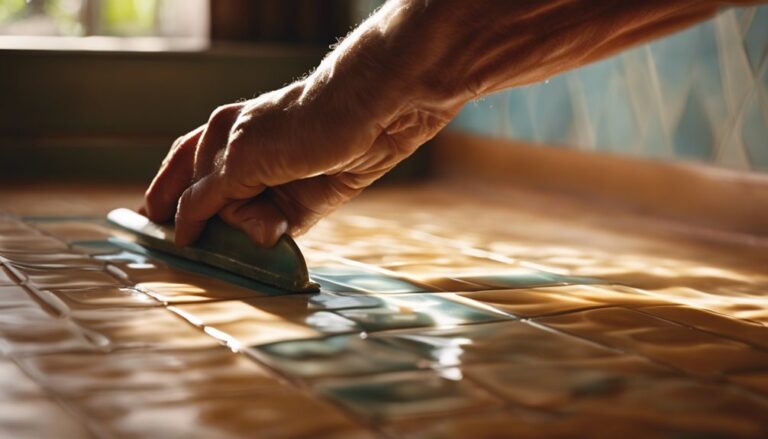Vinyl plank flooring is a durable and versatile flooring option designed to resemble natural wood. Composed of multiple layers, including a protective wear layer and a design layer, it offers excellent scratch and stain resistance, making it ideal for high-traffic areas. You can choose from various types, such as luxury vinyl plank and waterproof options, catering to different needs and aesthetics. Installation can be done through glue-down, floating, or nail-down methods. With its easy maintenance and extensive design possibilities, vinyl plank flooring can be a practical choice for any space. Explore further to discover more about its benefits and options.
Definition of Vinyl Plank Flooring
Vinyl plank flooring, a popular choice in modern interior design, consists of long, narrow planks made from a synthetic material that mimics the appearance of natural wood. Its vinyl durability makes it an excellent option for high-traffic areas, as it resists scratches, stains, and moisture, ensuring longevity. You'll find it suitable for various environments, from residential homes to commercial spaces, thanks to its flooring versatility. Vinyl plank flooring is available in numerous styles and finishes, allowing you to achieve your desired aesthetic without sacrificing practicality. Installation is often straightforward, enabling you to enjoy your new floor quickly. Ultimately, this flooring option combines aesthetic appeal and robust performance, empowering you to create a space that reflects your personal style while meeting functional needs.
Composition and Structure
Understanding the composition and structure of vinyl plank flooring helps clarify its advantages and performance. The flooring typically consists of several distinct composition layers that contribute to its durability and appeal. These layers work together to provide exceptional structural integrity.
- Wear Layer: Protects against scratches and stains.
- Design Layer: Offers realistic visuals, replicating wood or stone.
- Core Layer: Provides stability and moisture resistance.
These layers guarantee that vinyl plank flooring can withstand daily wear while maintaining its aesthetic qualities. By understanding these components, you can appreciate how they contribute to the overall performance and longevity of your flooring choice, giving you the freedom to enjoy your space without worry.
Manufacturing Process
While the manufacturing process of vinyl plank flooring may seem complex, it primarily involves a series of well-defined steps that guarantee each plank meets high standards of quality and performance. First, high-quality production materials, primarily PVC, are sourced and processed. Next, advanced manufacturing techniques, like extrusion and calendaring, shape these materials into planks. Finally, finishing touches like embossing and coating confirm durability and aesthetic appeal.
| Step | Description |
|---|---|
| Material Preparation | Sourcing and processing PVC |
| Shaping | Extrusion and calendaring techniques |
| Finishing | Embossing and protective coating |
These carefully orchestrated steps create vinyl planks that are both functional and visually appealing, giving you the freedom to choose a stylish flooring option.
Types of Vinyl Plank Flooring
When considering vinyl plank flooring, you'll encounter several types tailored to different needs. Luxury vinyl plank offers enhanced aesthetics and durability, while traditional vinyl plank is a cost-effective option. Additionally, waterproof vinyl plank provides superior moisture resistance, making it ideal for high-humidity areas.
Luxury Vinyl Plank
Luxury vinyl plank (LVP) flooring offers a versatile and aesthetically appealing solution for those seeking the look of natural wood without the maintenance challenges. With its luxury features, LVP provides a high-quality alternative that combines style and practicality.
Consider these aspects of LVP:
- Authentic Design: It mimics the grain, texture, and color variations of real hardwood, enhancing your space's aesthetic appeal.
- Durability: Built to withstand heavy foot traffic, it's resistant to scratches, dents, and moisture.
- Easy Installation: Many LVP options come with click-lock systems, allowing for a straightforward DIY project.
Choosing luxury vinyl plank flooring gives you the freedom to enjoy beautiful, low-maintenance surfaces that elevate your home.
Traditional Vinyl Plank
Traditional vinyl plank flooring comes in various types, catering to different needs and preferences. This flooring option often features a 4mm to 8mm thickness, providing a sturdy surface that mimics the look of natural wood. You'll find traditional vinyl available in a range of designs, aligning with current design trends, from rustic to contemporary aesthetics. Many styles offer a wide selection of colors, textures, and patterns, allowing you to customize your space effectively. Installation is generally straightforward, with options for glue-down or floating systems. Additionally, this type of vinyl plank is cost-effective, making it an attractive choice for homeowners seeking quality without breaking the bank. Embrace the freedom of design while enjoying the practical benefits of traditional vinyl flooring.
Waterproof Vinyl Plank
Waterproof vinyl plank flooring is an ideal choice for areas prone to moisture, such as kitchens, bathrooms, and basements. This flooring type offers excellent waterproof benefits, ensuring your spaces remain dry and stylish. With advanced technology, it features enhanced moisture resistance, making it tough against spills and humidity.
Consider these key aspects of waterproof vinyl plank:
- Durability: Built to withstand heavy foot traffic and wear.
- Easy Maintenance: Simple to clean and resistant to stains.
- Versatile Design: Available in various styles to match your decor.
Benefits of Vinyl Plank Flooring
Vinyl plank flooring offers a range of benefits that make it a popular choice for homeowners and designers alike. Its durability features guarantee it withstands heavy foot traffic, making it ideal for busy households. You won't have to worry about scratches or dents, as this flooring is engineered for resilience. Additionally, vinyl plank flooring boasts aesthetic versatility, allowing you to achieve the look of hardwood or stone without the associated costs and maintenance. It's available in various colors, textures, and styles, giving you the freedom to create the perfect ambiance in any room. Plus, its waterproof nature makes it suitable for kitchens and bathrooms, enhancing practicality while maintaining beauty. You can enjoy a stylish, functional space with ease.
Installation Methods
When considering installation methods for vinyl plank flooring, you'll find that several options cater to different preferences and skill levels. Here are three popular methods to choose from:
- Glue-Down Installation: This method involves applying adhesive directly to the subfloor, providing a permanent bond. It's ideal for high-traffic areas but requires careful application.
- Floating Floor: With this DIY method, planks interlock and "float" above the subfloor without glue. This offers easier installation and the flexibility to remove or replace planks.
- Nail or Staple Down: Best for plywood subfloors, this method secures planks with nails or staples, guaranteeing stability.
No matter which method you choose, following proper installation tips will promote a successful project and beautiful results.
Maintenance and Care
To keep your vinyl plank flooring in ideal condition, you'll need to adopt effective cleaning techniques. Regular maintenance not only enhances its appearance but also helps in preventing damage. Understanding the proper care methods will guarantee your flooring lasts for years to come.
Cleaning Techniques
Proper maintenance of vinyl plank flooring is essential for preserving its appearance and extending its lifespan. To achieve this, you'll want to adopt effective cleaning techniques that suit your lifestyle. Here are three key practices:
- Regular Sweeping: Do this daily to remove dirt and debris. A clean surface prevents scratches.
- Mopping: Use a damp mop with gentle cleaning products weekly. Avoid excessive water to prevent damage.
- Spot Cleaning: For spills, quickly wipe them up with a soft cloth and mild cleaning products to avoid stains.
Preventing Damage
Although vinyl plank flooring is durable, it can still be susceptible to damage if not properly cared for. To guarantee effective damage prevention, invest in quality flooring protection measures. Use felt pads under furniture legs to avoid scratches and place rugs in high-traffic areas. Avoid dragging heavy items across the floor, as this can cause dents. When cleaning, opt for a soft broom or microfiber mop, steering clear of harsh chemicals that could degrade the surface. Be mindful of moisture; wipe up spills immediately to prevent warping. Regularly inspect for signs of wear, addressing issues promptly. By maintaining vigilance and adopting these simple practices, you can extend the life of your vinyl plank flooring and enjoy its beauty for years to come.
Cost Comparison
When comparing the costs of vinyl plank flooring, it's essential to evaluate various factors that can influence your overall budget. Understanding the cost effectiveness of your options will aid in budget planning. Here are three key considerations:
- Material Quality: Higher-quality vinyl planks may have a steeper initial cost but often provide better durability and longevity.
- Installation Expenses: Factor in whether you'll be hiring professionals or opting for DIY installation, as this can considerably impact your total investment.
- Maintenance Costs: Consider the long-term upkeep; some vinyl options require less maintenance, translating to savings over time.
Design Options and Aesthetics
After considering the costs associated with vinyl plank flooring, exploring the design options and aesthetics available can greatly enhance your space. Vinyl plank flooring offers a wide range of color variations, allowing you to select hues that resonate with your personal style. From rich, dark woods to light, airy tones, the choices are extensive. Additionally, you'll find various pattern choices, such as planks that mimic traditional hardwood or contemporary tile designs. This versatility enables you to create a unique look tailored to your preferences, whether you're aiming for a rustic charm or a sleek modern vibe. Ultimately, the aesthetic possibilities with vinyl plank flooring empower you to design a space that truly reflects your individuality.
Environmental Considerations
As you consider vinyl plank flooring, it's essential to weigh its environmental impact alongside its aesthetic appeal. While vinyl offers durability and design versatility, there are sustainability concerns to keep in mind. Here are three key points:
- Production Process: The manufacturing of vinyl flooring involves chemicals and energy-intensive processes, raising questions about sustainability.
- Longevity: Its durability means it can last for years, reducing the need for frequent replacements, which can mitigate some environmental impacts.
- Recycling Options: Some manufacturers offer recycling programs, allowing you to responsibly dispose of your flooring when it's time for an upgrade.
Frequently Asked Questions
Is Vinyl Plank Flooring Suitable for Pets?
If you're a pet owner, you'll be pleased to know that vinyl plank flooring boasts impressive pet durability, with some options being 100% waterproof. This makes cleaning up accidents a breeze. For best care, consider using a pet-friendly cleaner and regularly sweeping to minimize scratches. With the right maintenance, vinyl plank flooring can withstand your furry friend's antics, providing a stylish and practical solution that allows you to enjoy your space freely.
Can Vinyl Plank Flooring Be Installed Over Existing Flooring?
Yes, you can install vinyl plank flooring over existing flooring, but flooring compatibility is essential. Make sure the surface is clean, dry, and level. If you've got carpet, it should be removed, while tile or hardwood can often stay. For installation tips, use an underlayment to help with sound absorption and moisture control. Always check the manufacturer's guidelines to guarantee a successful and long-lasting installation that meets your needs for freedom and flexibility.
How Long Does Vinyl Plank Flooring Last?
When considering vinyl plank flooring, you might wonder about its longevity. Generally, it boasts impressive vinyl durability, lasting anywhere from 10 to 30 years, depending on quality and maintenance. To extend its life, keep it clean and avoid heavy furniture pressure. Regularly sweeping and damp mopping can prevent scratches and wear. By following these maintenance tips, you'll guarantee your flooring remains stylish and functional for years, giving you the freedom to enjoy your space.
Is Vinyl Plank Flooring Waterproof?
Yes, vinyl plank flooring boasts excellent waterproof features, making it ideal for areas prone to moisture, like kitchens and bathrooms. Its construction typically includes a waterproof core, enhancing its moisture resistance. This means you don't have to worry about spills or humidity damaging your floors. However, while it can handle moisture well, it's still wise to wipe up any standing water promptly to maintain its durability and appearance.
Can Vinyl Plank Flooring Be Recycled?
When it comes to vinyl plank flooring, you might feel like you're caught between a rock and a hard place regarding recycling. The good news is that vinyl recycling is possible, though it's not universally available. Some facilities accept vinyl products, reducing their environmental impact. However, always check local guidelines. Embracing sustainable practices can help you contribute to a greener planet while enjoying the benefits of your flooring choice.




